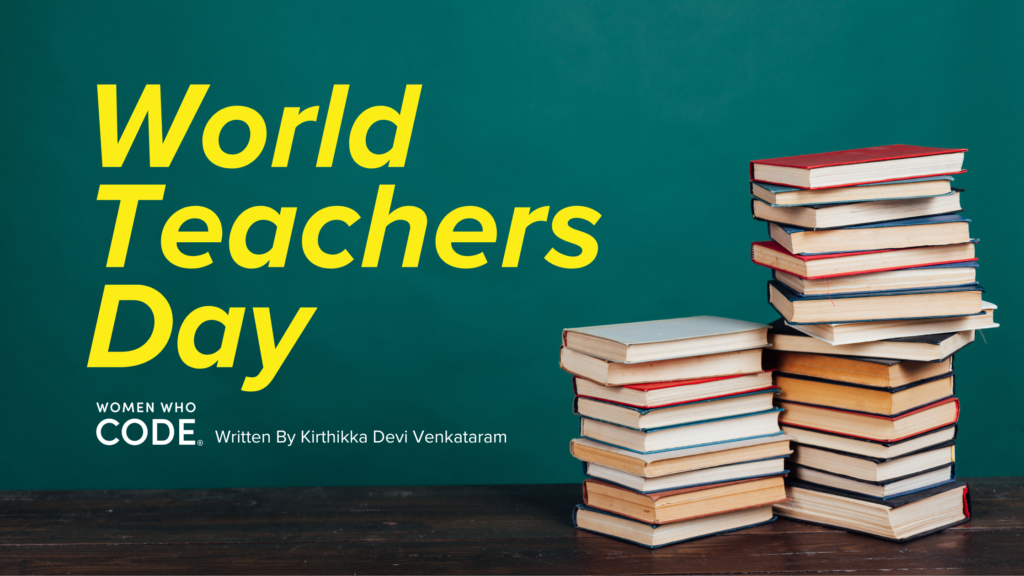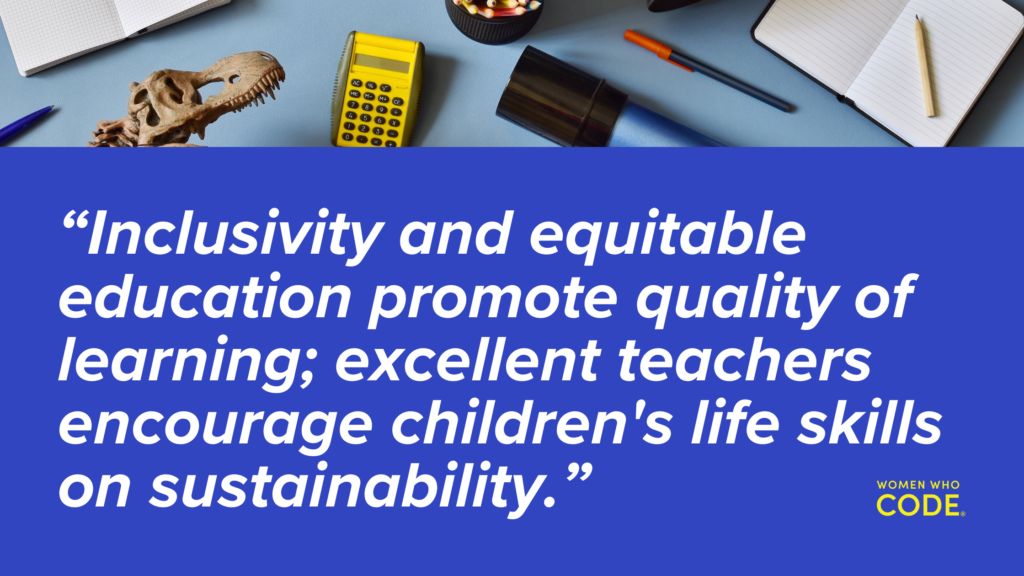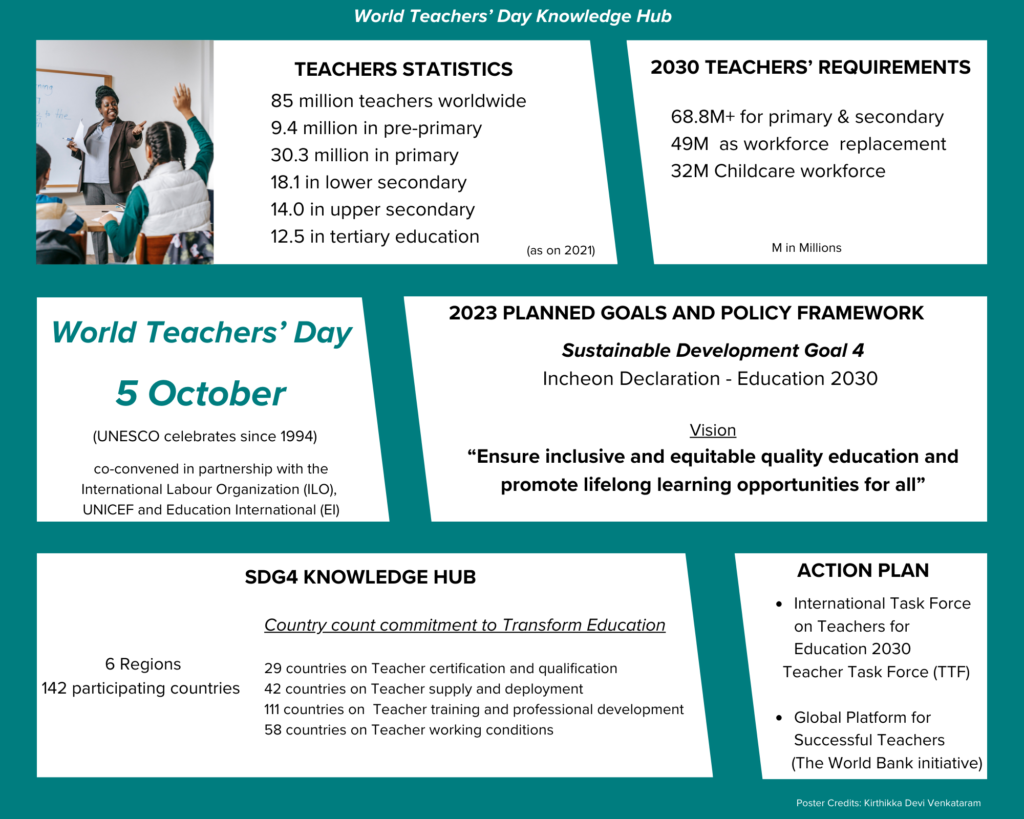World Teachers Day
Written by Kirthikka Devi Venkataram

“Teachers, the powerful radical pillars who connect the unknown principles to the proven facts, demonstrating the depth of learning, building a rudimentary foundation and stimulating sparks of knowledge in an individual.”
The Personal Proliferation:
Darkness overspread the sky as I walked along the seashore with the incredible swash of the waves touching my feet under a full moon. I asked my grandfather, a primary grade teacher, “Where is this moonlight coming from? Why do waves form a crest and tough pattern? How are seashells created in the fletch of water? Who is inside the sea to trigger a roar?” Many such debriefs kindled me in my I grade. After an hour back home, my grandfather gifted me one of his favorite scientific reasoning books and encouraged me to nurture the art of asking the right questions! His supraliminal senses blessed me with becoming a creamy layered STEM professional, completing my Master of Engineering with flying colors as a University rank holder.
In my 18 years of focused education, there were fewer chances of learning by rote rather than experiential learning with the competitive score-based assessment methodology. I must recognize every teacher, starting from my primary school throughout my educational journey. Showing gratitude, building empathy, and leading confidently at critical times was bestrewed since childhood.
A few evergreen events date back to my college days; demonstrating live engineering drawing on the spot before the class in the engineering drawing classes increased my spontaneity, coordinating with educationalists and branding technology for a social cause in external forums improved societal responsibility, winning in National and Zonal level competitions honing my skills as trained by teachers succeeding themselves as my backbone and accolading my proficiency and sports medals relishes me at my low time. I was fortunate to lead teams, groups, or a cohort from my school days till my Executive Development Program, serving as a leader during different periods. Many were offered and recommended by my teachers in multiple schools. Establishing myself in a new environment, socializing to create cultured friends, and ultimately gaining trust and confidence to lead was not easy, although that paved a path to direct and collaborate with domain adepts.
After a couple of decades, I was reminded of the shoreline scene when similar questions were brought up by my kid’s interrogation. Remarks made by Ruth Fulton Benedict, an American Anthropologist and folklorist, come to mind:

The Social Prominence:
A year ago, a signatory online publication highlighted a school in South India supporting marginalised children working on building children’s critical reasoning skills. The article revealed the students’ lack of knowledge about other places or languages except their own. The students were taught in their mother tongue where only 5% of the natives existed. Irrespective of their poor language skills, a consistent plan to develop their inquiry-based concept discovery was prepared by the management. In regards to this, the school appointed designated qualified teachers who were not the students native language speakers rather subject matter experts and exhibited proficiency in English. They collaborated with the school management, parents and local people to establish a new learning pattern by observation and experimental techniques. Management prepared a consistent plan to develop their inquiry-based concept discovery. The school appointed designated qualified teachers who were not the students’ native language speakers but rather subject matter experts who exhibited proficiency in English. They collaborated with the school management, parents, and local people to establish a new learning pattern by observation and experimental techniques. To the teachers’ astonishment, the feedback from the parents was highly welcoming, and the student’s enthusiasm and involvement sparked them toward learning.
I anguish about the demarcation of limited exposure and resources to such children, where technology-based education was a touching dream. This was a worldwide concern, and as a Women Who Code community member, I proactively focussed on aspects that would create a bridge between the community of teachers and students, empowering them with knowledge and resources.

The growing need for the right to quality education through qualified educators emphasized a day of celebration to recognize the teachers who transform education, reflect the support they need to fully deploy their talent, and turn global attention towards the teachers’ profession. World Teachers’ Day (WTD) was celebrated first on October 5, 1994. Here’s a quick fact sheet: World Teacher’s Day Statistics.

Inclusivity and equitable education promote quality of learning; excellent teachers encourage children’s life skills on sustainability. Statistics on educator qualifications indicate a steady decline due to service provision, satisfying working conditions, information and communication access, and a number of countries experiencing emergencies and protracted crises.
- 85% of primary teachers globally were trained in 2018.
- In Southern Asia, 72% of primary teachers were trained in 2018 compared to 78% in 2013.
- Among the six regions, sub-Saharan Africa constitutes only 64% of primary and 50% of secondary school teachers were trained in 2017-18 compared to 71% and 79%, respectively, in 2005. This decline is due to the rising demand for education from a growing school-age population.
The theme of 2023 World Teachers’ Day construes,
“The teachers we need for the education we want: The global imperative to reverse the teacher shortage.”
The celebration took place in the UNESCO headquarters in Paris. Concept and events designed by UNESCO, the 2023 celebrations pivoted the importance of stopping the decline in the number of teachers and then starting to increase that number at the top of the global agenda. This primary factor was captured in the Sustainable Development Goal 4 (SDG4) agenda, where 142 countries took part in this ongoing commitment towards transforming education and educator quality. The International Task Force on Teachers for Education 2030, also known as the Teachers Task Force (TTF), is a unique partnership created in 2008 to advocate the teachers and teaching profession around the world to work on addressing the acute teacher shortage, where 15 million teachers to be recruited by 2030.
The Promulgation of the Teaching Profession:
The extraordinary nature of the challenge invites equally powerful transition steps, where the World Bank launched the Global Platform with five key principles for Successful Teachers to help countries enhance their policies to improve teaching and learning, concentrating on the low and middle-income countries as designated by UNESCO.
Working towards transforming every classroom through qualified, motivated, and empowered teachers, the International Task Force on Teachers for Education 2030 embarked, “Teachers are the most important in-school factor when it comes to learning,” whereby every learner deserves a qualified teacher.
Resources for Educators:
Aiming to direct on the proper information availability, here is the list of resources for teachers worldwide, dedicating to World Teachers’ Day 2023 as a humble learner.
- TRC Landing page | Teacher Task Force
- Varkey Foundation
- UNESCO Prize for Girls’ and Women’s Education
- Teach Primary: Helping Countries Track and Improve Teaching Quality
- Teach free classroom observation tool supported by The World Bank Group works with 170 countries; find your region here
- Spotify Podcast: World Bank EduTech Program – Technology4Teaching
- The World Bank initiative –SUCCESSFUL TEACHERS, SUCCESSFUL STUDENTS: LAUNCH OF THE GLOBAL PLATFORM FOR SUCCESSFUL TEACHERS
- UNESCO World Teachers’ Day Official webpage: World Teachers’ Day | UNESCO
- Email: worldteachersday@unesco.org